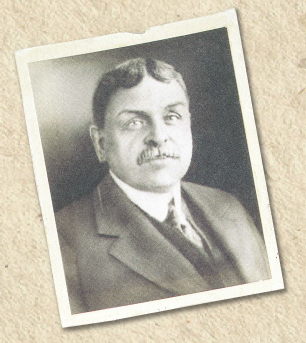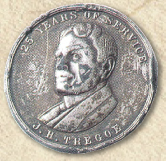
 After Tregoe’s retirement, he was Professor of Finance, College of Commerce and Business Administration, University of Southern California, and continued to write articles for Credit Monthly. He referred to the National Association of Credit Men as his “foster parent.” Tregoe was a marvelous writer, and the history of the first 25 years of the association was published in his book, Pioneers and Traditions of NACM.
After Tregoe’s retirement, he was Professor of Finance, College of Commerce and Business Administration, University of Southern California, and continued to write articles for Credit Monthly. He referred to the National Association of Credit Men as his “foster parent.” Tregoe was a marvelous writer, and the history of the first 25 years of the association was published in his book, Pioneers and Traditions of NACM.
* * *
Benjamin B. Tregoe, son of J. H., served as the manager of the Foreign Credit Interchange Bureau (FCIB) when it was established in 1919; from 1925 through 1928, he served as the manager of National’s first western office in San Francisco.
Ben Tregoe married a secretary in the NACM office, and now we have in our midst, J. H.’s grandson, Benjamin B. Trogoe, Ph. D, Chairman of the board of directors and co-founder of Kepner-Tregoe, Inc., a company founded on pioneering research in rational problem solving and decision making. Dr. Tregoe is on the board of directors of the J. M. Smucker Company, a member of NACM, and Kepner-Tregoe has more then fifty NACM members as clients.
J. HARRY TREGOE President, 1902-1904
J. Harry Tregoe served as the fifth NACM President (Chairman) for two terms, 1902 to 1904. Although he was not the first president of the association, he was a pioneer and initial leader, one whose ability, enthusiasm, energy and idealism built the National Association of Credit Men from a small group that convened in Toledo, Ohio in 1896 to one of the nation’s most respected and influential organizations of businessmen. He is truly NACM’s “founding father” and the founder of the credit profession. Tregoe became a figure of national importance during his many years of service in the organization. He was a profound student of economics and a prophet whose council was sought and heeded by businessmen in all sections of the country.
Tregoe was actively identified with the National Association of Credit Men since its inception in 1896. While a manager of the credit department in Baltimore, the panic of 1893 wrought a business havoc, which impressed and concerned him. With his law degree and experience in the investment banking business, he began to study the structure of business and came to the conclusion that lack of proper credit organization was the chief cause of the disaster. Tregoe spent the following years fighting for the improvement of credit conditions. He never ceased crusading for high ethical standards and sound principles in credit policies and practices.
He was a man of magnetic personality and charm who gathered together the loose threads of credit principles and wove them into a fabric that has endured.
In 1911, he took over the helm of NACM as Executive Director (president) and remained in that position until 1927.
Tregoe was called the “directing genius” of the National Association of Credit Men. He helped to secure and enforce laws for the protection of creditors and the promotion of honesty in business. He fostered and promoted the education of credit men and brought about a stronger feeling of confidence and a more cordial reciprocity among them.
He was well know as a credit executive, a credit educator and a writer of credit books such as Credit and Its Management and Effective Collection Letters. He wrote editorials each month for the association’s official magazine and a newsletter on credit and business topics, which were widely quoted throughout the country by daily newspapers and trade magazines. He was an authority on the subject of commercial credit, and his writings won him the title “Credit Philosopher.”
In 1927, at the time of his retirement, it was said that his career was without parallel in commercial history. The principles on which the nation’s credit technique is based were worked out largely by Tregoe, and the strength of the foundation which supports the credit commercial structure proves the soundness of his thought and the keenness of his vision. He believed that the most important accomplishment of the National Association of Credit Men in its beginning was to inspire cooperation between credit executives and the free exchange of credit experiences—the foundation for today’s credit profession.